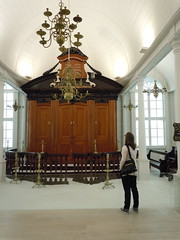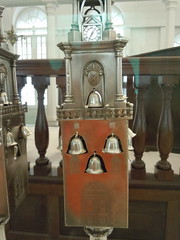Just some drivel from a PhD student in 17th century English literature. Masoret is Hebrew for tradition; Masor is also the Hebrew word for saw. Since i hope to be learning and blogging about traditional woodworking (amongst sundry other things), i thought it was an apt play on words. Before you ask, yes, i have a glamorous social life.
Sunday, 26 December 2010
James I, Sport, and Unity
Tuesday, 30 November 2010
Westerkerk Rimonim (Finials)
 The Israel Museum just underwent a $100 million renovation. One of the highlights of the visit i took with my mum was the Tzedek VeShalom Synagogue, built in 1734 in Paramaribo, Suriname. For the woodworkers out there, the ark is made of Cyprus wood and mahogany. Below is a video about the synagogue and some really cool footage of the restoration. Just some brief history of the settlement of Jews in the area. According to our tour guide, in 1630, about 500 Jews came to Suriname to establish sugar plantations. They named them after cities in the land of Israel: Hebron, Tiberias, Jerusalem, Beersheba, to name a few of the plantations that existed in Suriname. The name of the Jewish settlement was actually the Jodensavanne, or the Jewish Savannah. To read more about the Jewish community in Suriname, click here.
The Israel Museum just underwent a $100 million renovation. One of the highlights of the visit i took with my mum was the Tzedek VeShalom Synagogue, built in 1734 in Paramaribo, Suriname. For the woodworkers out there, the ark is made of Cyprus wood and mahogany. Below is a video about the synagogue and some really cool footage of the restoration. Just some brief history of the settlement of Jews in the area. According to our tour guide, in 1630, about 500 Jews came to Suriname to establish sugar plantations. They named them after cities in the land of Israel: Hebron, Tiberias, Jerusalem, Beersheba, to name a few of the plantations that existed in Suriname. The name of the Jewish settlement was actually the Jodensavanne, or the Jewish Savannah. To read more about the Jewish community in Suriname, click here.
 In addition to paying homage to their biblical roots, the Jews of Suriname paid tribute to their Spanish-Portugese Dutch roots. Whilst having a peek around the synagogue, we noticed that one of the finials for the Torah scrolls was an unmistakable nod to the Westerkerk in Amsterdam. You know--the one that Anne Frank mentions? Pretty cool, eh? How many synagogues today would commission, let alone tolerate, a Torah adornment in the style of a church? Pretty remarkable...
In addition to paying homage to their biblical roots, the Jews of Suriname paid tribute to their Spanish-Portugese Dutch roots. Whilst having a peek around the synagogue, we noticed that one of the finials for the Torah scrolls was an unmistakable nod to the Westerkerk in Amsterdam. You know--the one that Anne Frank mentions? Pretty cool, eh? How many synagogues today would commission, let alone tolerate, a Torah adornment in the style of a church? Pretty remarkable...Thursday, 22 July 2010
Coopers Versus Joyners
Monday, 28 June 2010
The Character of Holland...According to the English
 In a previous post, we have referred to English hatred of the Dutch, and it's no secret that during the Anglo-Dutch Wars, the English launched some pretty nasty anti-Dutch propaganda that would have made Goebbels proud. Below is a poem by Andrew Marvell (1621-1678), a friend of Milton's in the service of Cromwell. It's pretty rude, but some of it is quite funny! Lest any Dutchies get offended, Marvell also used anti-Semitic stereotypes to berate his opponent, Samuel Parker:
In a previous post, we have referred to English hatred of the Dutch, and it's no secret that during the Anglo-Dutch Wars, the English launched some pretty nasty anti-Dutch propaganda that would have made Goebbels proud. Below is a poem by Andrew Marvell (1621-1678), a friend of Milton's in the service of Cromwell. It's pretty rude, but some of it is quite funny! Lest any Dutchies get offended, Marvell also used anti-Semitic stereotypes to berate his opponent, Samuel Parker:who but such an Hebrew Jew as you, would, after an honest man hade made so full and voluntary Restitution, not yet have been satisfied without so many pounds of his flesh over into the bargain.This is actually in the context of a debate rooted in Hebraism, so the insults get way more interesting than that (check out Rosenblatt's book on Selden, chapter 5).
Unsurprisingly, in the early modern period, religion was a source of conflict. The English disapproved of the Dutch pluralistic society, which was rooted in Republican sensibilities; this disregard for order and hierarchy was dangerous. The Dutch took the reformist call for personal autonomy in interpreting Scripture too far:
They are generally so bred up to the Bible that almost every Cobbler is a Dutch doctor of divinity...yet fall those inward illuminations so different that sometimes seven religions are found in one family.' (Schama)And finally, here is the poem. Incidentally, if you're Dutch and Jewish, well, Marvell will offend you in one form or another! ;-)
Sunday, 27 December 2009
Even Old New York Was Once New Amsterdam

Monday, 30 November 2009
Addendum: Thanksgiving & Flemish and Dutch New York
Sunday, 29 November 2009
Dutch-American Heritage Day

Since it was Dutch American Heritage day (16 of November), I just wanted to mention a book I read recently and loved. Russell Shorto’s The Island at the Center of the World. Whenever I go to New York, I always like to hunt around for the remains of New Amsterdam. But it's always hard to find. There are a few monuments and plaques, and some passing references here and there, but i always get the feeling that the story of Dutch America has been short-changed. It makes sense, really. The Dutch do not hold dear their language like the French, nor their pomp like the English. Instead--the infamous red-light district aside--it's a culture of modesty. Everything is diminutive. For instance, glass is a glasje (small glass) and a small glass is doubly small--a kleine glasje. Culturally, the Dutch are almost apologetic, even when people (mostly Americans) have no clue where the Netherlands is or the language spoken there ('do they speak Hollish in Holland?'). I hear Dutch people always preempting this with 'it's a very small country', and other explanations. My personal experience has been the same. I remember my Dutch mother giving up and just saying 'I'm from Europe,' (rolling her eyes, sometimes) after a while. My mother was also more than happy to let the language go with us children, so most of what we know has been self-taught later on in life. My grandparents tried to intercede but not necessarily on behalf of the Dutch language--they wanted my mother to speak to us in her strongest language after Dutch--French (also to no avail)!
Russell Shorto's best-seller saves the Dutch culture of America from being let go. Besides the obvious adage that it is the victors who write history, there are other reasons for the English stranglehold on American history. Shorto humorously explains that American historians found an easier story in Puritan New England than the more rough-and-tumble reality of Dutch Manhattan.
Accounts like that of a woman who, while her husband dozed on a nearby chair, ‘dishonourably manipulated the male member’ of a certain Irishman while two other men looked on. Excessive rigidity (of the moral kind) was not the sin of New Amsterdam’s residents.’ (p. 85)
{Shorto's wit is another great feature of the book. I think the following is the best sentence i have ever come across in a book about history:
The Reverend Jonas Michaelius might well have won a contest for the moodiest, bitchiest resident of New Amsterdam (p. 64)
Phenomenal!}
The historical revisionism of American history is, bluntly put, a conscious decision of total haters with English ancestry. Think i'm being harsh? Shorto brings evidence that nineteenth-century historians considered the Dutch chapter of American history inconsequential at best. Descriptions of the
petty cheeseparing of the Batavian provinces, with their windmills and barren soil, fit only for fuel
are among the kinder references made to the Dutch in nineteenth century American historical surveys.
Shorto instead brings to life Adriaen van der Donck, a young lawyer sent to New Netherland who pushed for the Republican-style government and freedom that became so central to America's cultural heritage. Shorto draws you into his tale by beginning with the work of Charles Gehring, who has worked for over 30 years (and is still going!) translating over 12,000 folios of Dutch colonial records. This book is sweet. Shorto does not divorce New Netherland history from 17th century Dutch history (if you loved Simon Schama's page-turner on the topic you will totes dig this), enriching both in the process. There's also a lot of cool facts to learn. I had no idea that the first kosher butcher on Manhattan Island was a Polish Jew named Asser Levy who stood up to Stuvesant's anti-Semitic wrangling. Want to know who Downing Street was named after? Read the book.
Despite my enthusiasm for this book, there is a huge problem in its premise. Essentially, Shorto makes the argument that the Dutch colony had its roots in thinkers like Grotius and Spinoza; liberals who advocated civil over religious law, in contrast to the witch burning crazy English colonies. To read Grotius as freeing natural law from theology is a dangerous misreading of Grotius at best, and a gross misrepresentation at worst. What follows is the philosophy that the only tolerant society is one that divorces itself from its religious heritage, which diminishes the monumental achievement of the 'tolerant' society of 17th century New Netherland, which was, indeed rooted in theology. That's where Shorto seems to drop the ball. He has us imagining van der Donck studying law at Leiden with Grotius, (which is awesome, granted), but if anything stands out about 17th century Leiden (besides the fact that it was full of Englishman wearing buckled hats and pimp-shoes), it's that the hottest topic of study gripping the place was Hebraism. That is to say, people like Grotius, and later, Selden in England, were defining international and natural law according to rabbinic sources such as the Talmud and Maimonides. A liberal environment, certainly. A Godless one, definitely not.